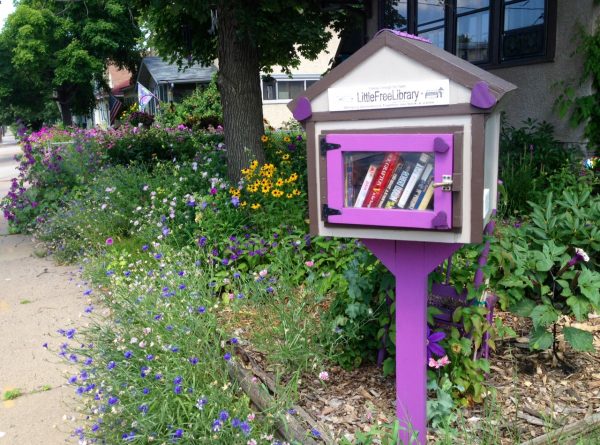With concerns around COVID-19 a priority, we want to share information with you, our valued stewards and supporters, about best practices at Little Free Library book-sharing boxes.
First, we encourage you to follow the advice of the Centers for Disease Control and Prevention (CDC) and your local health authorities to know what is safe for your community. They are best informed on how to keep you and your neighbors healthy.
The CDC says the virus spreads easily between people, but they are not concerned with books transmitting the coronavirus. They note that the best way to protect yourself—and others—is to get vaccinated and boosted, wear a mask, get tested when appropriate, maintain a distance of six feet from others, wash your hands often, and routinely clean high-touch surfaces. Learn more here.
To slow the spread of the coronavirus, please follow these rules at your Little Free Library:
- If you are sick, don’t share books in your library until you are symptom-free.
- If your neighbors are sick, they should not visit your library.
- Wash your hands or use hand sanitizer every time you use your library.
- Do not gather with others at your library. Social distancing is critical to preventing coronavirus transmissions.
- If you anticipate being in close contact with others at your library, wear a mask.
- Get the COVID-19 vaccine when it is available to you, to protect yourself and others.
Choosing to Close Your Library or Keep It Open
During these uncertain times, some Little Free Library stewards are weighing the question of whether or not their library should stay open.
Many stewards wish to provide a beacon of hope to their neighbors by keeping their Little Free Library open. The majority continue to share books, which is more important than ever while schools and public libraries are closed. Others have converted their libraries into sharing boxes offering items like canned goods and toilet paper for neighbors in need. Passersby can then interact with the Little Free Library as they see fit. (Read about ways Little Free Library stewards are lending a hand here.)
Other stewards are taking extra precautions and temporarily closing their Little Free Libraries. (See one example of a steward getting creative with her library while it’s on hiatus here.) If your community is a hotspot for coronavirus activity, we recommend you temporarily suspend service at your library.
Ultimately, given the dynamic nature of what is going on, we defer to the judgement of the individual to make the decision that is best for them and their community.
“The strength of the Little Free Library network has been the wonderful individuals that volunteer to steward a Little Free Library,” says Little Free Library executive director Greig Metzger. “These engaged community members make decisions on design, placement, and how to support their library.
“We share all the information we have but defer to the wisdom of the local steward to act in accordance with what the CDC and local health authorities recommend.”
Free Downloadable Signs
Library is Open Sign (PDF)
Click to download a free 8.5″ x 11″ sign letting library visitors know your library is open but to please use it with caution.
Library is Closed Sign (PDF)
Click to download a free 8.5″ x 11″ sign letting library visitors know your library is closed during COVID-19.
Library is Open Sign (PDF)
Click to download a free 8.5″ x 11″ sign in Spanish letting library visitors know your library is open but to please use it with caution.
Library is Closed Sign (PDF)
Click to download a free 8.5″ x 11″ sign in Spanish letting library visitors know your library is closed during COVID-19.
Cleaning and Using Your Little Free Library
If you choose to keep your Little Free Library open, we offer these suggestions for cleaning your library to help make it safer for all.
- Wash or sanitize your hands before opening your Little Free Library.
- Clean the entire library with disinfectant wipes. Pay special attention to high-touch areas like the handle and bookshelves.
- To be extra-cautious, clean the books with a microfiber cloth or disinfectant wipes.
- Wash or sanitize your hands again.
“The main point is to clean and disinfect your high-touch surfaces,” said Dr. David Berendes in a presentation hosted by the Institute of Museum and Library Services. “The good news is that this virus is extremely susceptible to many of the typical disinfectants that you’re already probably using.”
“We are not concerned at all about paper-based materials like books being a transmission route,” he continued.
“For paper-based products, we’re really not concerned, and you don’t have to worry about finding ways to disinfect those materials.” said Berendes. “The virus, if it’s present, would be present in very low quantities and would die off quickly…. If you were really concerned, you could wait for a 24-hour period before lending the book if you were in an area of high-transmission.”
If you choose to clean your books, use a microfiber cloth rather than disinfectant wipes on paperbacks or books with cloth covers, so they wouldn’t be damaged. For books with plastic covers, you can use disinfectant wipes. According to CNN Health, cleaning removes viruses and bacteria from surfaces, but disinfecting kills them.
We will continue to monitor Little Free Library best practices and share information with you when we have it. As we navigate this unprecedented situation, our gratitude goes out to Little Free Library volunteer stewards and supporters everywhere. Please do what is best for your community, and remember—we’re in this together!
For more information on Little Free Libraries and COVID-19, please read a letter from our executive director, Greig Metzger, here.
We will regularly update this post as the situation evolves. First published March 12, 2020. Last updated December 29, 2021.

